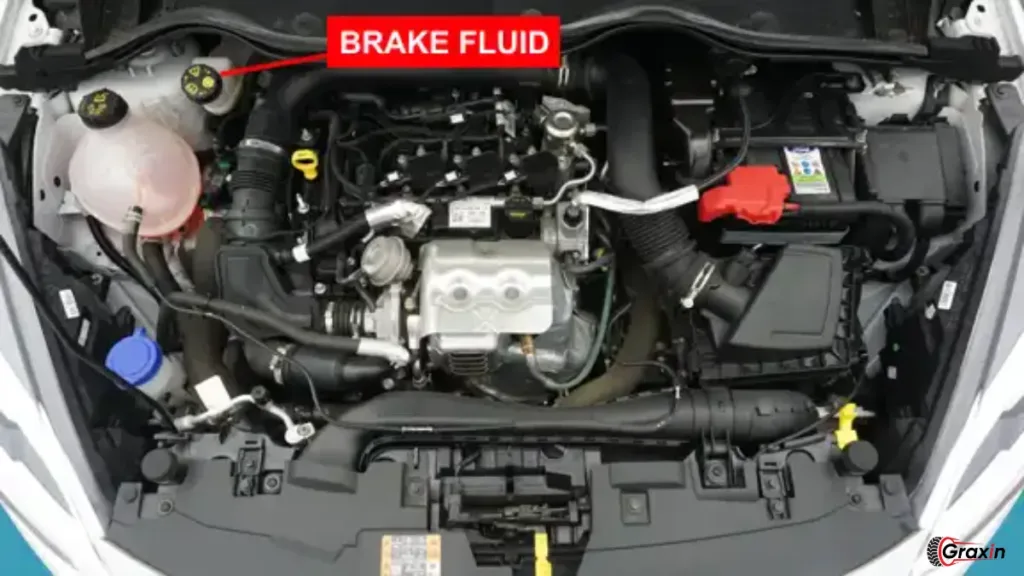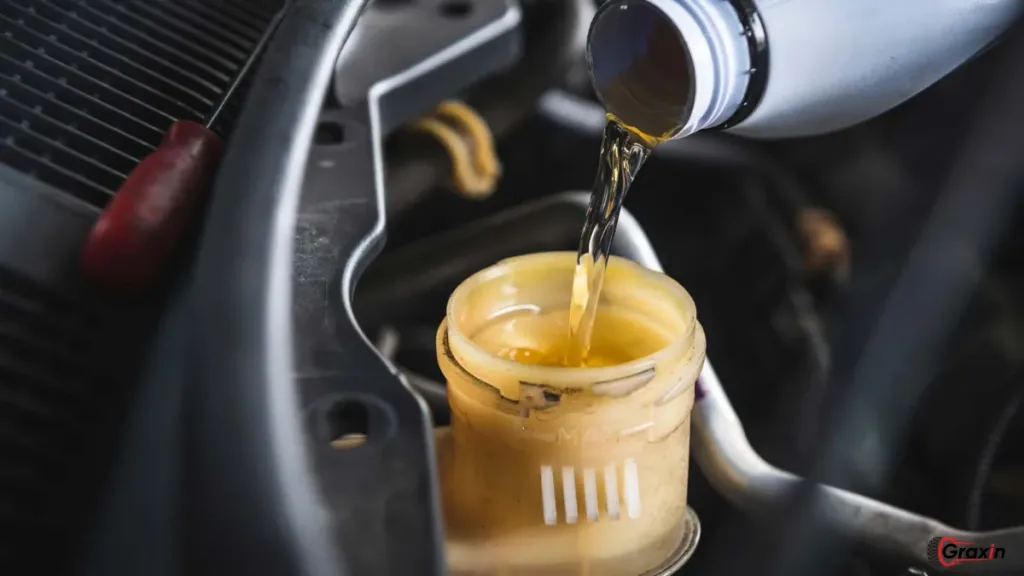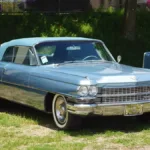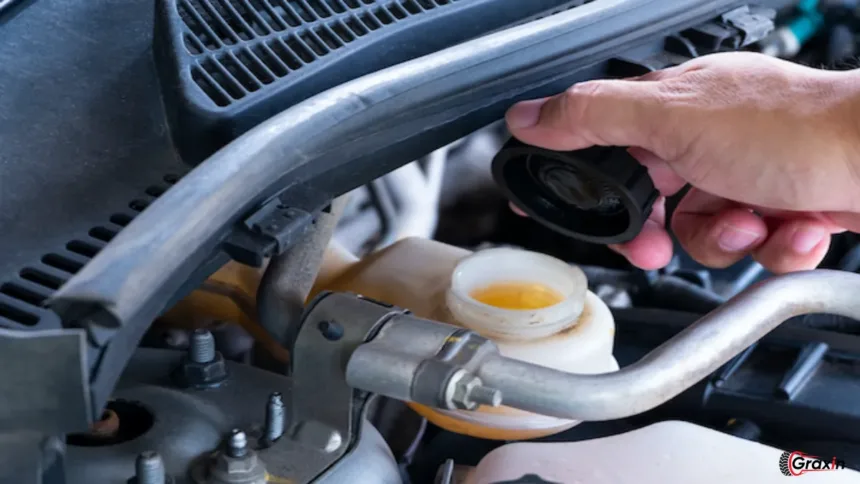It is very important to maintain your automobile’s braking system, not only for the car’s performance itself but also for one’s own safety while on the road. One of the key elements that most people forget is actually a brake fluid, which is like the unsung hero of the braking world- if it’s missing, you’re in for a wild and extremely dangerous ride. But how do you know that you have low brake fluid? In this article, we go in-depth with symptoms of low brake fluid, why it is important, and what you should do with it. Buckle up, because this is one ride you don’t want to miss.
What is Brake Fluid and Why Is It Important?
It is hydraulic fluid that transmits force via the braking system. There is a pressure exerted at the brake pedal upon which force is transferred to the brake calipers. Then, the caliper forces are exerted on brake pads, which are adhering onto the rotors to finally slow and/or stop the vehicle.
Now you might think of brake fluid as something simple, but in reality, it’s a pretty sophisticated substance. It is designed to be stable under extreme temperatures and resistant to moisture entering into the system, where it could potentially corrode or compromise braking. Without it-or with too little of it-your car won’t be able to stop in time.
Types of Brake Fluid
There are different types of brake fluids, usually classified by their DOT rating (Department of Transportation). The most common types include:
- DOT 3: Standard fluid used in most vehicles.
- DOT 4: Similar to DOT 3 but with a higher boiling point.
- DOT 5: Silicone-based, often used in high-performance or vintage vehicles.
Now that you know the importance of brake fluid, let’s get into what happens when it runs low.
Low Brake Fluid Symptoms: A Breakdown

Not sure if your brake fluid is running low? Here’s a breakdown of the most common symptoms you’ll encounter.
Spongy or Soft Brake Pedal
One of the most apparent and early warning signs for low brake fluid is a spongy brake pedal. That is when you depress it, it feels soft or sinks toward the floor more than normal, that’s a red flag.
Why? There are a few reasons. First, with less brake fluid there is more air in the system, which makes for an uneven pressure distribution. Sometimes this can make the brake feel a bit touchy, mushy, as though you’re squeezing a sponge-there’s give, but not nearly enough firmness to make you feel like you’re in control.
Longer Stopping Distance
Whenever your brake fluid runs low, your stopping power has diminished. Don’t you get the feeling sometimes that it takes a little longer than usual to get your car to stop? Perhaps due to reduced hydraulic pressure in the brake lines, a stop may be made at high speeds or during an emergency braking situation when speed and response become critical factors.
Brake Warning Light
The brake warning light seems like waving a large red flag right in front of your face. When it comes on, don’t ignore it. Most modern cars will have a sensor within the brake fluid reservoir that triggers the warning light when the level gets low.
Check the brake fluid level if you see this light. Other issues may be signalled by this light, but low brake fluid is probably the most prevalent reason you’ll encounter.
Brake Pedal Vibration
Feeling a little vibration or pulsation when braking? Well, that’s not normal, and the low brake fluid might be the cause. When there’s insufficient fluid, air bubbles can creep in the system, keeping the pressure uneven; this usually means experiencing a pulsating brake pedal. It not only feels strange but also less efficient at braking.
Unusual Noises When Braking
Do you hear screeching or grinding sounds every time you press on the brakes? While this can be due to bad brake pads, it may also be related to low brake fluid. Low levels of fluid can cause a situation where the brake pads do not hit the rotors with the intended firmness-thus bringing about scary sounds. Nobody wants to hear a car cry out for help, right?
ABS System Issues
If your car is equipped with an Anti-lock Braking System (ABS), low brake fluid level will make the ABS lights come on or trigger faulty malfunctions. Low levels will dilute the efficiency of brake fluid, meaning that the pressure on the brakes as adjusted by the ABS system for wheel lock-up cannot be achieved. Thus, the risk is of getting stuck in a situation where the ABS system fails to perform its functions.
Why Does Brake Fluid Get Low?

Understanding the causes of low brake fluid can help you prevent it from happening. Here are some common reasons why your brake fluid levels might drop:
Leaks in the Brake System
Leaks are one of the common causes by which the level of brake fluids drops. These leaks may cause at a number of different points in the braking system-brake lines, calipers, master cylinder-and can be the reason for trouble. When there are puddles of brake fluid under your car, it is time to take it in for a check-up.
Worn Brake Pads
As brake pads wear down, more brake fluid is used to keep the brakes functioning properly. This causes the fluid levels to drop over time. So, if you’re consistently adding brake fluid without finding any leaks, it might be time to check your brake pads.
Air in the Brake Lines
If air enters the brake lines, it can cause a significant drop in hydraulic pressure, leading to low brake fluid symptoms. This usually happens when there’s a leak or if the system wasn’t properly bled after brake maintenance.
Old or Contaminated Brake Fluid
Brake fluid degrades over time and can absorb moisture from the environment, which lowers its boiling point and causes corrosion in the brake system. Regularly flushing your brake fluid as per your vehicle’s maintenance schedule can prevent this issue.
Dangers of Driving with Low Brake Fluid
Now that you know the symptoms, let’s talk about why you should never drive with low brake fluid. It’s not just a matter of inconvenience it’s a major safety hazard.
Reduced Braking Power
Low brake fluid can lead to a complete loss of braking power, especially if it’s left unchecked. Imagine driving at high speeds and suddenly realizing your car won’t stop as quickly as it should. That’s a recipe for disaster.
Brake Failure
In extreme cases, low brake fluid can lead to brake failure, where your brakes stop working altogether. This is particularly dangerous if you’re on a highway or in heavy traffic.
ABS System Malfunction
In case of the discussion above, low brake fluid messes with your ABS system. This is to help the system stop you safely by preventing wheel lock-up. If the ABS fails due to a lack of fluid, you are at higher risks of skidding or control loss in emergency braking.
What To Do If You Have Low Brake Fluid
So, what should you do if you notice any of these low brake fluid symptoms? Here’s a quick guide:
Check Brake Fluid Levels
The first thing to do is pop the hood and check the brake fluid reservoir. Most cars have a transparent reservoir with “min” and “max” markings. If the fluid is below the “min” line, it’s time for a top-up.
Inspect for Leaks
If you notice low brake fluid levels, check under your car for any leaks. Even small drips can indicate a bigger issue with your brake lines, calipers, or master cylinder.
Visit a Mechanic
If you’re not comfortable inspecting or topping off the brake fluid yourself, head to a mechanic. They’ll not only refill the brake fluid but also check for any leaks or worn components.
Conclusion
Low brake fluid is no laughing matter, as it would signify a more serious condition from spongy brakes to a total brake failure. Not paying attention and allowing the brake fluid levels to fall would mean expensive repair jobs and worse, accidents on the road.
FAQs
1. Can I drive with low brake fluid?
It’s not advisable to drive with low brake fluid. Doing so can lead to reduced braking power or complete brake failure, putting you and others at risk.
2. How often should I check my brake fluid?
It’s a good idea to check your brake fluid at least once a month or whenever you take your vehicle in for regular maintenance.
3. What happens if you don’t fix low brake fluid?
Ignoring low brake fluid can cause serious damage to your braking system, including brake failure and damage to the ABS system.
4. How do I know if my brake fluid needs to be replaced?
Brake fluid should be replaced if it looks dark or contaminated. Most manufacturers recommend a brake fluid flush every 30,000 to 60,000 miles.
5. Is low brake fluid an emergency?
Yes, low brake fluid can be considered an emergency, especially if you’re noticing other symptoms like a spongy brake pedal or longer stopping distances.
Also Read: Guide to Diesel Fuel Pump: Everything You Need to Know







